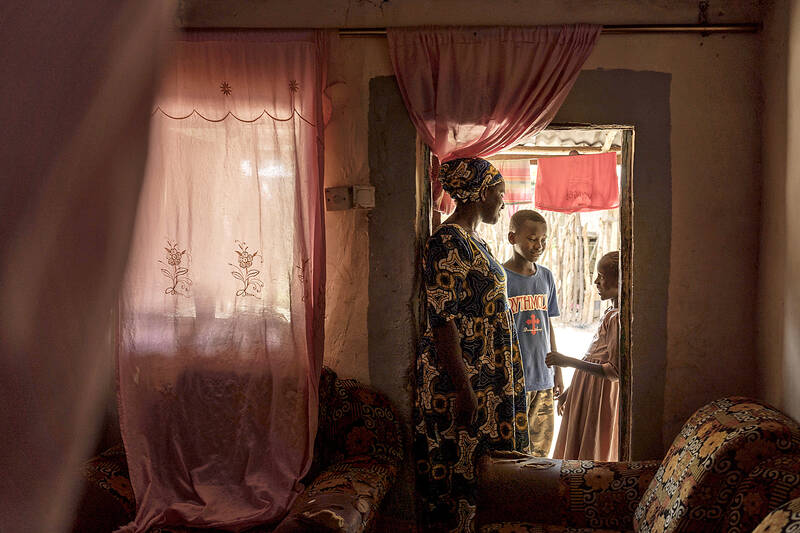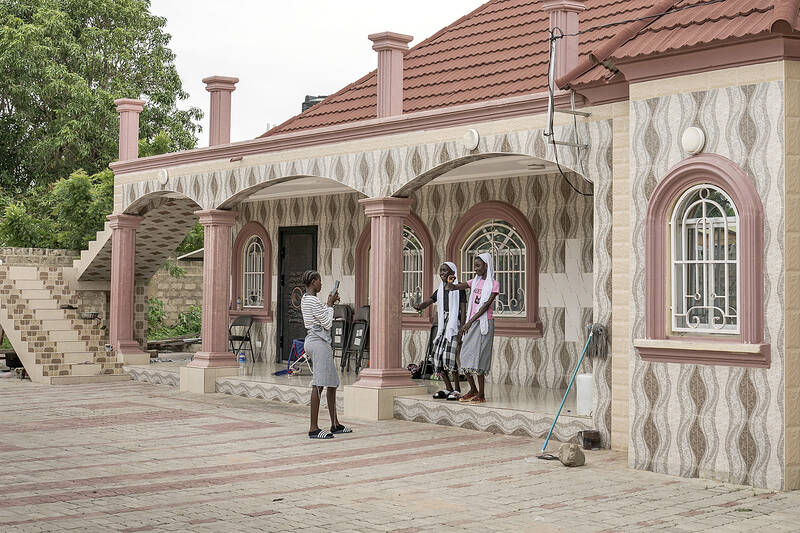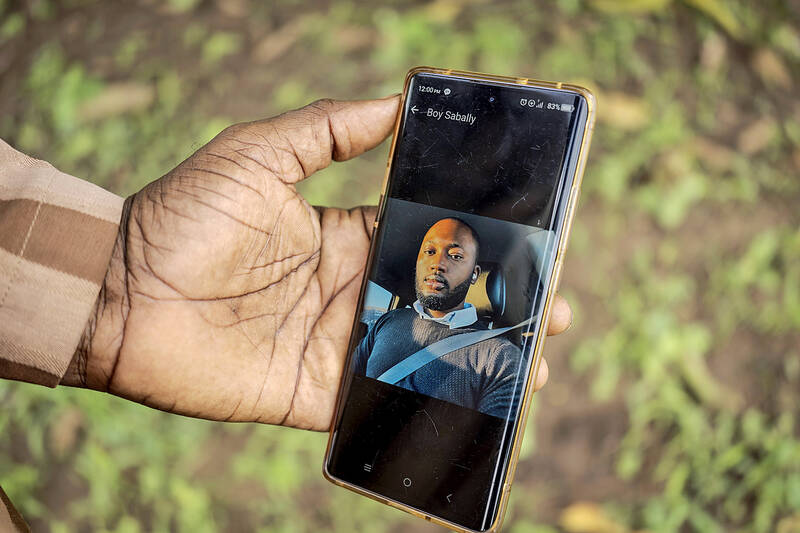Binta Bah met her husband last year on a dating app and instantly fell in love. They spent hours every day glued to their mobile phones and soon got married on a video call.
However, they have met in person only once, when Suleyman Bah returned Gambia for a visit, months after the wedding.
He is one of tens of thousands of West Africans who have undertaken the perilous journey to Europe, and is now working in a factory in Germany.

Photo: AP
Every month he sends money home. He is not alone — Gambians abroad send hundreds of millions of dollars a year in remittances, the World Bank said.
The remittances account for one-fourth of the tiny country’s economy — the highest such proportion on the African continent.
Even as European countries increase their efforts to keep migrants out, Gambians and other West Africans keep risking the dangerous route, known locally as “the backway,” in unsafe boats across the Atlantic Ocean — or they trek hundreds of kilometers across the Sahara Desert before crossing the Mediterranean Sea.

Photo: AP
Almost 10 percent of Gambia’s population of 2.7 million has left the country, most of them young men from rural areas. The money they send is an economic lifeline for their families, but their absence weighs heavily on their communities.
“It’s difficult to be apart,” the 24-year-old Binta Bah said of her long-distance marriage. “But it’s good when the other person takes care of you.”
“Whenever I need something, like to see a doctor, he sends the money straight away,” added Bah, who lives with her mother-in-law.

Photo: AP
Life is increasingly difficult in their village of Kwinella, where people for centuries grew rice, maize, millet and peanuts to make a living. However, climate change and outdated farming practices have made their traditional lifestyle unsustainable.
Moustapha Sabally, deputy head of Kiang Central Province, which includes Kwinella, said the rains have become unpredictable for farming, which is still done by hand and without tractors.
Few young men are around to do that work, he said, adding that about 70 percent of them left the province for the capital, Banjul, or for Europe.
That leaves women and older people who struggle with the long and laborious work on the land, forcing the community to depend on remittances, Sabally said.
Without the remittances, “life would be very difficult,” he said.
Gambia, the smallest country on the African mainland, is surrounded by Senegal except for a sliver of the coast where the Gambia River flows into the Atlantic Ocean. According to the World Bank, 75 percent of its population lives in poverty and there is virtually no industry. The economy relies on imports, and living costs have skyrocketed since the COVID-19 pandemic.
Nearly 60 percent of Gambians are younger than 25, and nearly half of them are unemployed. Despite EU efforts in West Africa to reduce the number of migrants, the lack of jobs reinforces the conviction of many that leaving is their only option.
Last year alone, more than 8,000 Gambians arrived in Europe, the International Organization for Migration said.
Many others die trying. Earlier this year, a boat carrying 300 migrants, mostly from Gambia and Senegal, capsized off Mauritania; more than a dozen were killed and at least 150 others went missing. Last year, a young man from Kwinella drowned on his way to Europe.
Because the journey is so risky, most young men slip away for Europe without letting their loved ones know they are leaving.
Musukebbe Manjang’s 39-year-old husband left Kwinella for Italy 10 years ago, after he could no longer make enough money from construction work.
She never encouraged him to leave, “the risk was just too high,” she said.
One evening, when Manjang was pregnant with their third child, her husband’s younger brother called him from Italy, and he simply disappeared without a word. He later called to say he had left for Europe.
Then she heard nothing for nine months, and her anger turned to fear. When he finally arrived in Italy, he called and said that he had been kidnapped in Libya, long a key starting point for many Mediterranean crossings to Europe.
These days, Manjang’s husband sends about 14,000 dalasi (US$204) a month, enough to cover the children’s school fees, food and clothes, she said.
On a personal level, it has been difficult, Manjang said.
“He misses all the important moments,” she said. “He hasn’t even met our youngest daughter.”
Gambia’s central bank says remittances amounted to more than US$730 million last year, but experts say that the rising costs of living would push more men to migrate abroad.
Eliman Jallow, 42, the Gambia-born founder of a UK-based company that facilitates sending money home to Africa, said that his clients are a mix, from highly skilled workers to manual laborers.
The son of Ansumana Sanneh from Kaiaf, a village not far from Kwinella, was a teacher. He left for Europe because he could barely make a living on a teacher’s monthly salary of 5,000 dalassi.
His journey was cut short when he was kidnapped by a Libyan militia and Sanneh paid the equivalent of US$700 in ransom before his son was freed and returned home.
Sanneh believes the dreams of the young village men are fueled by the misguided idea of Europe as a promised land, but with rising costs of living in European countries, migrants today are able to send less money home than in the past, he said.
The gamble is simply not worth the risks, Sanneh said.
However, stories of success and evidence of what remittances can do often outweigh such words of caution — large concrete village homes built with money sent back are solid; images posted on social media by migrants who work in Europe appeal to the young men still in the village.
Despite his ordeal, Sanneh’s son hopes to find a way to leave Gambia again.
Not far from their home, a group of teenagers practiced a dance routine in front of a stylish brick house, its driveway lined with spotless pink tiles.
The teens were recording a video for TikTok, they said, and chose the prettiest — and largest — village house for the background.
The house belongs to a family whose young man migrated to the US, for many, the most coveted migrant destination, they said.

CHIP RACE: Three years of overbroad export controls drove foreign competitors to pursue their own AI chips, and ‘cost US taxpayers billions of dollars,’ Nvidia said China has figured out the US strategy for allowing it to buy Nvidia Corp’s H200s and is rejecting the artificial intelligence (AI) chip in favor of domestically developed semiconductors, White House AI adviser David Sacks said, citing news reports. US President Donald Trump on Monday said that he would allow shipments of Nvidia’s H200 chips to China, part of an administration effort backed by Sacks to challenge Chinese tech champions such as Huawei Technologies Co (華為) by bringing US competition to their home market. On Friday, Sacks signaled that he was uncertain about whether that approach would work. “They’re rejecting our chips,” Sacks

Taiwan’s long-term economic competitiveness will hinge not only on national champions like Taiwan Semiconductor Manufacturing Co. (TSMC, 台積電) but also on the widespread adoption of artificial intelligence (AI) and other emerging technologies, a US-based scholar has said. At a lecture in Taipei on Tuesday, Jeffrey Ding, assistant professor of political science at the George Washington University and author of "Technology and the Rise of Great Powers," argued that historical experience shows that general-purpose technologies (GPTs) — such as electricity, computers and now AI — shape long-term economic advantages through their diffusion across the broader economy. "What really matters is not who pioneers

TAIWAN VALUE CHAIN: Foxtron is to fully own Luxgen following the transaction and it plans to launch a new electric model, the Foxtron Bria, in Taiwan next year Yulon Motor Co (裕隆汽車) yesterday said that its board of directors approved the disposal of its electric vehicle (EV) unit, Luxgen Motor Co (納智捷汽車), to Foxtron Vehicle Technologies Co (鴻華先進) for NT$787.6 million (US$24.98 million). Foxtron, a half-half joint venture between Yulon affiliate Hua-Chuang Automobile Information Technical Center Co (華創車電) and Hon Hai Precision Industry Co (鴻海精密), expects to wrap up the deal in the first quarter of next year. Foxtron would fully own Luxgen following the transaction, including five car distributing companies, outlets and all employees. The deal is subject to the approval of the Fair Trade Commission, Foxtron said. “Foxtron will be

BUBBLE? Only a handful of companies are seeing rapid revenue growth and higher valuations, and it is not enough to call the AI trend a transformation, an analyst said Artificial intelligence (AI) is entering a more challenging phase next year as companies move beyond experimentation and begin demanding clear financial returns from a technology that has delivered big gains to only a small group of early adopters, PricewaterhouseCoopers (PwC) Taiwan said yesterday. Most organizations have been able to justify AI investments through cost recovery or modest efficiency gains, but few have achieved meaningful revenue growth or long-term competitive advantage, the consultancy said in its 2026 AI Business Predictions report. This growing performance gap is forcing executives to reconsider how AI is deployed across their organizations, it said. “Many companies